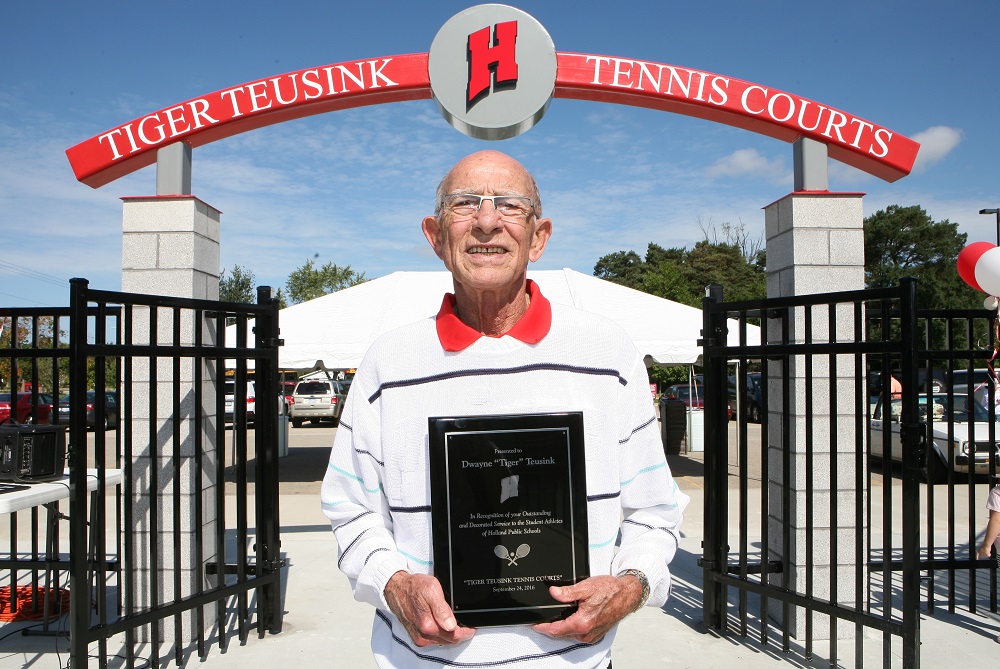
In Memoriam: Tiger Teusink (1936-2021)
By
Geoff Kimmerly
MHSAA.com senior editor
September 9, 2021
Dwayne “Tiger” Teusink, a longtime Holland tennis legend and a prominent foundation builder for MHSAA tennis at the statewide level, died Monday, three days before his 85th birthday. A coach for nearly a half-century, he also continued to assist the MHSAA in administering the sport nearly until his death.
Teusink, a 1954 graduate of Holland High and later Hope College, began his teaching career at Wyoming Lee, then moved on to teach and coach high school tennis at Jackson for seven years and then Holland for 35. He retired from teaching in 1989 but continued to coach at Holland High until 1998. He also served for a time as athletic director.
He leant a significant behind-the-scenes voice in the formation of high school tennis as it’s played in Michigan today. He was on the committee that in 1976 introduced the flighted MHSAA tournament structure developed to promote a team format that remains the standard. While at Holland, Teusink managed 63 Regional and 17 MHSAA Finals tournaments, and he served on the Finals seeding committee from 1980-2011. He continued assisting with the draw through 2019 and provided data for Finals seeding through this spring.
Teusink coached high school teams to a 453-176-4 record with 13 conference and 16 MHSAA Regional titles, and his Holland boys team was a runner-up at the 1976 Class A Final. He also coached at Hope College from 1994-2009. Holland High School’s tennis facility was renamed “Tiger Teusink Courts” in 2016.
Teusink earned induction into the Michigan High School Tennis Coaches Association Hall of Fame in 1986, the Michigan High School Coaches Association Hall of Fame in 1989 and the National High School Athletic Coaches Association Hall of Fame in 2003. He was named National High School Coach of the Year by the United States Tennis Association in 2005, receiving his award at the U.S. Open.
Click for his obituary, and also for a Second Half feature from 2016.
PHOTO: Tiger Teusink stands with the plaque presented to him in 2016, when the Holland High School tennis courts were renamed in his honor. (Photo courtesy of the Holland athletic department.)

The More Things Change ...
December 20, 2013
By Rob Kaminski
MHSAA benchmarks editor
As we begin another calendar year, let's take a brief look at how the mission of school sports has (or hasn’t) changed since 1955, when former MHSAA Executive Director Charles E. Forsythe presented this practicum to the University of Michigan.
The following is an excerpt:
Presented by Charles E. Forsythe
Practicum in Physical Education
University of Michigan, Ann Arbor
Tuesday, June 21, 1955
WHY DO WE HAVE INTERSCHOLASTIC ATHLETICS IN OUR SCHOOLS?
 To meet the urge for competition which is a basic American tradition – let’s keep it.
To meet the urge for competition which is a basic American tradition – let’s keep it.- To provide a “whole school” interest and activity, bring in students other than athletes, enlist many student organizations.
- To teach students habits of health, sanitation, and safety.
- Athletics teach new skills and opportunities to improve those we have; this is basic educationally.
- To provide opportunities for lasting friendships both with teammates and opponents.
- To provide opportunity to exemplify and observe good sportsmanship which is good citizenship.
- Athletics give students a chance to enjoy one of America’s greatest heritages, the right to play and compete.
- One of the best ways to teach that a penalty follows the violation of a rule is through athletics.
- There must be an early understanding by students that participation in athletics is a privilege which carries responsibilities with it. Awarding school letter to a student is the second-highest recognition his school can give him – his diploma at graduation is the highest.
- To consider interscholastic athletic squad as “advanced” classes for the teaching of special skills – similar to bands, orchestras, school play casts, members of debating teams, etc. There is no reason why a reasonable amount of attention should not be given to such groups – as well as to those in the middle and lower quartiles in our schools. Both leaders and followers must be taught.
PHOTOS: (Top) Fans filled the arena for this MHSAA boys basketball tournament game. (Middle) Charles Forsythe served as the first executive director of the MHSAA.

